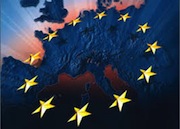One of the most successful European countries is Finland.
The Finish government minister for Europe, Alexander Stubb, told Bloomberg News May 3rd that, far from undermining the Euro currency, the European financial crisis has actually strengthened the currency and the commitment to it. He expects another eight European nations to start using the Euro within the next few years.
“The euro is irreversible in the sense that it’s the most stable currency Europe has ever seen. I don’t even contemplate the possibility of the euro breaking up in my lifetime. I see the euro including 24 to 25 member states within a few years.” Seventeen countries currently use the euro, which is controlled by the European Central Bank (ECB).
In January, George Friedman wrote for Stratfor: “I would argue that in 2013 we will begin to get clarity on the future of Europe.
“Taken as a single geographic entity, Europe has the largest economy in the world. Should it choose to do so, it could become a military rival to the United States. Europe is one of the pillars of the global system, and what happens to Europe is going to define how the world works. I would argue that in 2013 we will begin to get clarity on the future of Europe.” (“Europe in 2013: A Year of Decision,” Stratfor, January 3rd, italics mine).
Europe has been going through an ongoing financial, currency and debt crisis for three years. It appears that the worst is behind the continent, though rumbles out of Slovenia suggest the situation is still fluid.
What is clear is that Germany has emerged at the top of the European Union. Germany dominates the Union and is seen as the nation imposing rigid austerity on fiscally irresponsible countries.
“Angela Merkel has made Germany master of Europe in a way Hitler and Kaiser Wilhelm only dreamt of. The implications are frightening”, was the headline in the British Daily Mail, 19th April, above an article by Dominic Sandbrook.
Mr. Sandbrook wrote: “In countries such as Cyprus and Greece, which have felt the lash of German-imposed austerity, the German Chancellor has become a public hate figure, with protesters regularly likening her to the war criminals of the Third Reich.
“But in a sense, the hatred is a tribute to her success. For in just a few years, using the European Union as her vehicle, she has succeeded where Bismarck, Kaiser Wilhelm II and Hitler failed – turning an entire continent into a greater German empire.”
The EU will not be called the German Empire, or the Fourth Reich, as some detractors refer to it. But, it will inevitably be dominated and led by Berlin.
The President of the European Commission, Jose Manuel Barroso, said yesterday (May 7th) that, a federal European super-state “will be a reality in a few years.” (Daily Telegraph, London, May 8th)
Brendan Simms, a lecturer in European history and international relations at Cambridge University, has recently written: “Europe: The struggle for supremacy from 1453 to the present.” His book shows that the struggle for the control of Europe goes back to 1453, the year the Ottomans conquered Constantinople.
The Holy Roman Empire of the German Nation lasted one thousand years. Hitler was clearly influenced by this as he promised a “Third Reich” that would last a thousand years.
But Hitler was not the first one to realize the importance of controlling Europe as a means to dominate the world. Nor was he the last.
“In short, it has been the unshakeable conviction of European leaders over the past 550 years, even those who had no imperial aspirations themselves, that the struggle for mastery would be decided by or in the (Holy Roman) Empire and its German successor states. Queen Elizabeth I knew it; Cromwell knew it; Marlborough knew it; Stalin knew it; Gorbachev knew it; the Russians who furiously resisted the eastward expansion of NATO after the fall of the wall know it; and the elites trying to keep the European Union together today for fear of allowing Germany to slip its moorings know it. Whoever controlled central Europe for any length of time controlled Europe, and whoever controlled all of Europe would ultimately dominate the world.” (“Europe”, page 5, Brendan Simms, 2013).
Clearly, there is a lot at stake in Europe today. Germany has become the undisputed master of the continent again. This time not by military conquest and not under a dictatorship, but under the leadership of a woman who is indistinguishable from the average German hausfrau.
This all may seem unimportant in Washington. It should not be.
Developments in Europe in the 1930’s led to World War II. Twenty years earlier there had been another world war that started in Europe. European events have a habit of involving other nations outside of Europe.
There’s another reason Americans should take note.
Europe has gone through a lengthy fiscal crisis. America may be about to go through something similar as many states are broke and the federal government is in deep financial trouble.
A number of European countries have already gone through this and had to rely on Germany for help. Could the same happen to America? Where else would the US turn? Could a future German leader, having to bail out the US, force austerity on Washington?
We should also realize, as George Friedman pointed out, that the EU has the potential to rival the US militarily. When this happens, it will inevitably be led by Germany.
A German led Europe could indeed be the next global superpower!


i’ve been watching Angela Merkel for years, and have slowly come to admire her leadership in Germany. I have begun to realize, forgive me for this Melvin, but she’s quite similar to Margaret Thatcher and what she did for England. What Thatcher did for England, Merkel is doing for Europe, economically speaking, that is.